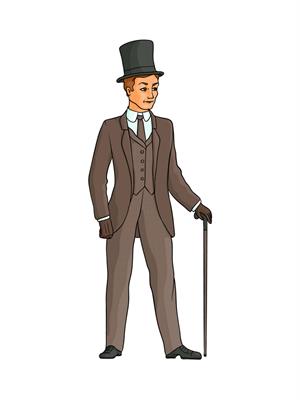PDF chapter test TRY NOW
I
“My aunt will be down presently, Mr Nuttel,” said a very self-possessed young lady of fifteen. “In the meantime you must try and put up with me.”
Framton Nuttel endeavoured to say something which should duly flatter the niece of the moment without unduly discounting the aunt that was to come. Privately he doubted more than ever whether these formal visits of a succession of total strangers would do much towards helping the nerve cure which he was supposed to be undergoing.
Explanation:
The very first line of Saki's "The Open Window" (which is “‘My aunt will be down presently, Mr Nuttel’, said a very self-possessed young lady of fifteen") introduces all of the central characters of the story: Vera- the young girl, Mrs Sappleton- her aunt, and Mr Framton Nuttel, the visitor (although the names of the former two are yet to be revealed).
We also learn that the story is set at Mrs Sappleton's house, and Mr Nuttle was paying her a visit. As she was yet to come down, the niece decides to receive the visitor and keep him engaged. The latter is a fifteen-year-old girl, and as the narrator describes, she is very calm and always in control.
The girl tells Mr Nuttel that he should "put up" with her until her aunt arrives. Though it was a simple remark, Mr Nuttel ends up breaking his head to provide a response that he deemed appropriate. He wished to say something flatteringly nice to the niece but was determined that his response shouldn't dismiss the aunt.
The dilemma suggests that Mr Nuttel is an overthinker, as he seems to channel his thoughts on unnecessary matters. Additionally, various psychological studies place a close connection between overthinking and anxiety disorders. The dilemma also reveals how Mr Nuttel is neither comfortable nor has any experience in socialising.
Moreover, as Mr Nuttel was visibly uncomfortable holding a conversation with the girl, he wonders how such formal visits with a series of strangers would help him with the nerve cure he was supposed to be receiving.
The line confirms our earlier observation that Mr Nuttel was facing a psychological problem. Also, the line explains that Mr Nuttel and his hosts are strangers, and that his visit was a part of the 'recommended socialising'- the treatment he was undergoing for his nervous problem.
We also learn that the story is set at Mrs Sappleton's house, and Mr Nuttle was paying her a visit. As she was yet to come down, the niece decides to receive the visitor and keep him engaged. The latter is a fifteen-year-old girl, and as the narrator describes, she is very calm and always in control.
The girl tells Mr Nuttel that he should "put up" with her until her aunt arrives. Though it was a simple remark, Mr Nuttel ends up breaking his head to provide a response that he deemed appropriate. He wished to say something flatteringly nice to the niece but was determined that his response shouldn't dismiss the aunt.
The dilemma suggests that Mr Nuttel is an overthinker, as he seems to channel his thoughts on unnecessary matters. Additionally, various psychological studies place a close connection between overthinking and anxiety disorders. The dilemma also reveals how Mr Nuttel is neither comfortable nor has any experience in socialising.
Moreover, as Mr Nuttel was visibly uncomfortable holding a conversation with the girl, he wonders how such formal visits with a series of strangers would help him with the nerve cure he was supposed to be receiving.
The line confirms our earlier observation that Mr Nuttel was facing a psychological problem. Also, the line explains that Mr Nuttel and his hosts are strangers, and that his visit was a part of the 'recommended socialising'- the treatment he was undergoing for his nervous problem.

Mr Framton Nuttel
Meanings of difficult words:
S.No | Words | Meanings |
1 | Presently | After a short time |
2 | Self-Possessed | To be calm and in control of your emotions at all times |
3 | Meantime | The time before something happens or before a specified period ends |
4 | Endeavour | Try to do or achieve something |
5 | Flatter | Lavish praise and compliments on someone, often insincerely and with the aim of furthering one's own interests |
6 | Niece | A bird known for its songs, especially for its high notes |
7 | A letter of introduction | A type of correspondence, usually email, used to introduce someone you know to someone else |
8 | Succession | A number of people or things of a similar kind following one after the other |
Reference:
National Council of Educational Research and Training (2008). The Open Window – Saki (pp. 55 - 61). Published at the Publication Division by the Secretary, National Council of Educational Research and Training, Sri Aurobindo Marg, New Delhi.
